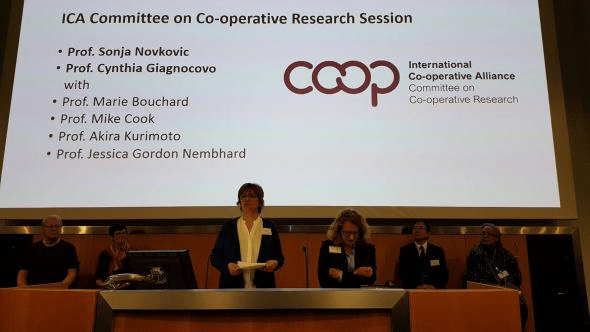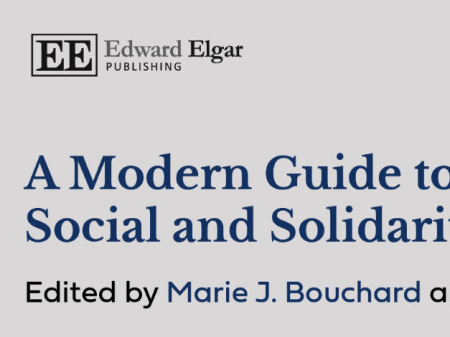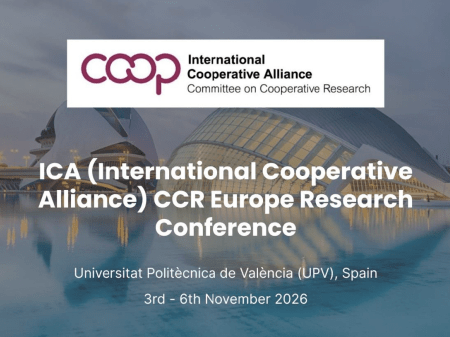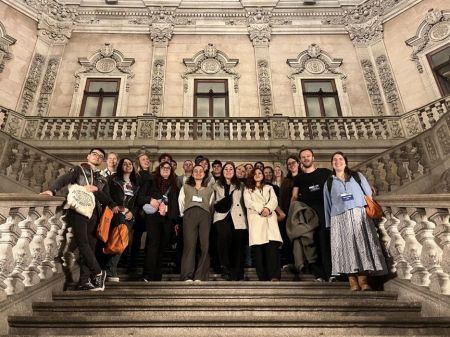We are pleased to share news of a new book relevant to…
Co-operative research: key trends and predictions

What is the future of co-operative research? This was one of the main topics explored at the International Co-operative Alliance’s Global Research Conference in Stirling, Scotland, in June. Featuring members of the Committee of Co-operative Research (CCR), an expert panel discussed current trends in co-operative research and looked at the potential implications.
CCR chair Prof Sonja Novkovic argued that in the past co-op research had developed in different disciplines with various theoretical backgrounds. However, co-operative research is now moving towards interdisciplinarity, she said.
“We are integrating what we do more and talking across disciplines,” explained Prof Novkovic. “This interdisciplinarity is a trend in general.” Other trends are also emerging in co-operative research, such as calls for measurement of the social impact of co-ops as well as the role of values and principles of co-operation. These trends are likely to shape the future of co-op research, said Prof Novkovic.
“We need more integrated disciplinarity, more integration between different fields of research and we will have to address the ideological divide and differences in the co-op sector itself. There are co-ops that are there to make a social impact and those whose members are only after economic gain,” she added.
Prof Cynthia Giagnocovo, who is a regional executive of the CCR, highlighted that co-ops were often created to respond to various needs. As new needs emerge, co-op studies also need to reform to fit these needs, as well as reflect a shift from products to services. Issues such as the environment, climate change, the scarcity of resources, dignified work, changing balances of power, refugees and displacement are all growing areas of interest for researchers – including those studying co-ops.
New intermediation companies continue to surface. At the same time technology enables customers and providers to interact digitally, through, for example, peer-to-peer lending platforms. With the growth of the shared economy and the digital revolution, co-ops have the opportunity to create value in this sector, changing the idea of property, she added.
Prof Marie Bouchard talked about her work at the International Centre of Research and Information on the Public, Social and Cooperative Economy (CIRIEC), an NGO scientific organisation based in Belgium. CIRIEC has been trying to position co-ops within the wider economy, while measuring impacts and mapping the sector. It has explored various concepts such as the third sector to the third system, the social economy and the social and solidarity economy; the organisation’s current work focuses on social economy ecosystems and explores the role of co-ops in these.
CIRIEC’s research shows that co-ops are still a social movement but, as they deal with day-to-day business, may lack the time required to focus on this aspect.
Another trend in co-operative research is an increasing tension between purism and growing hybridisation. Mike Cook highlighted that defining co-ops was complex due to the different approaches of individual countries.
“A number of people suggest co-ops are only this. If you don’t meet these criteria, you are not under us. But co-ops exist to meet the certain needs of a group. In Brazil they define it very explicitly; in the USA it is very loose.” He suggested an approach where researchers looked at what a co-op was achieving and whether it was enhancing the values of its original purpose.
Prof Jessica Gordon Nembhard of the City University of New York, another panellist in the session, emphasised that co-operative research was also developing in Africa, where researchers were going from a colonial to post-colonial and anti-colonial notion of co-ops, shifting the centres of knowledge.
Prof Akira Kurimoto, from the Japanese Consumer Co-operative Institute, highlighted how a focus for co-operative researchers could be the Alliance’s Blueprint for a Co-operative Decade – particularly the issues around governance and member participation, sustainable development, identity, legal framework and capital.
So where is co-operative research heading? According to Prof Kurimoto, potential future areas of study include best practices in co-operative governance, member participation, values and principles, co-op performance in times of crisis, contribution to the UN’s Sustainable Development Goals, the impact of co-operative law and co-operative statistics.




